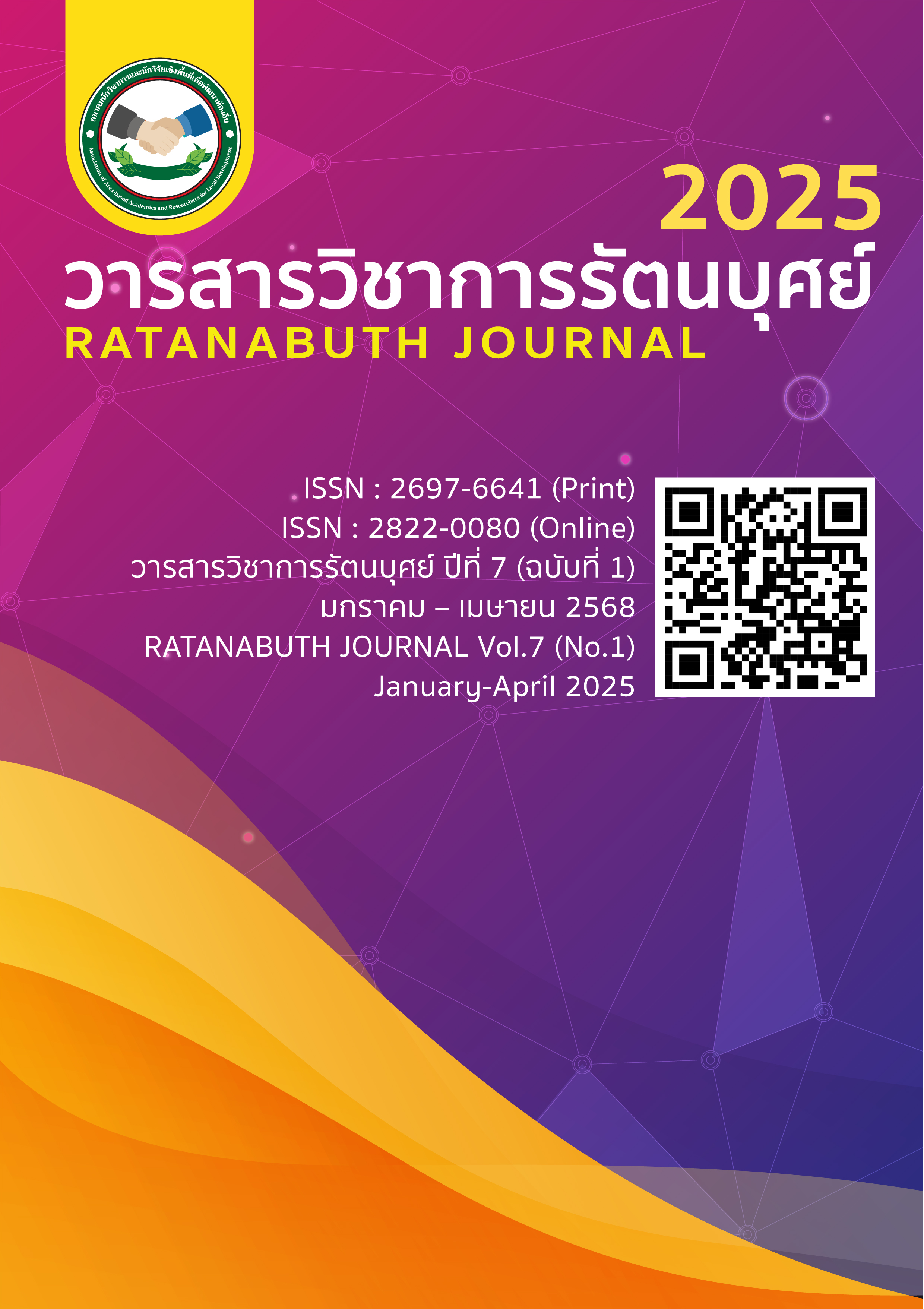Applying Buddhist-Oriented Funeral Welfare Services to Enhance the Quality of Life in Communities Applying Buddhist-Oriented Funeral Welfare Services to Enhance the Quality of Life in Communities
Main Article Content
Abstract
This academic article focuses on the application of Buddhist-oriented funeral welfare systems to promote sustainable community well-being. Drawing on the research of Phra Khru Pariyattisuttikhun Suttajitto and other scholars, it was found that the funeral welfare model in Roi Et Province aligns with Buddhist principles. The model is based on three key approaches: giving for mutual benefit, alleviating suffering through the practice of Dhamma, and fostering unity through sharing. The implementation framework includes establishing transparent welfare funds with temples serving as central hubs, governance based on principles of good ethics and Buddhist teachings, encouraging community participation, and building collaborative networks. Additionally, the article proposes the application of the CARE model, which encompasses Compassionate Giving, Attentive Communication, Responsibility and Selflessness, and Equanimity and Fairness. The case study in Roi Et demonstrates the successful integration of home, temple, and community, resulting in positive impacts on multiple dimensions of quality of life—economic, social, psychological, and spiritual. These include reducing the financial burden of funerals, enhancing mental security, and instilling moral values in daily life. Finally, the conclusion offers policy and operational recommendations that should involve all sectors to collectively drive social unity and sustainable development grounded in Buddhist principles.
Article Details

This work is licensed under a Creative Commons Attribution-NonCommercial-NoDerivatives 4.0 International License.
References
กรมการพัฒนาชุมชน. (2560). คู่มือการดำเนินงานกองทุนสวัสดิการชุมชน. กรุงเทพฯ: กระทรวงมหาดไทย.
ปัทมาวดี โพชนุกูล. (2559). กองทุนสวัสดิการชุมชนกับความมั่นคงของมนุษย์. กรุงเทพฯ: สำนักงานกองทุนสนับสนุนการวิจัย.
พระครูปริยัติสุทธิคุณ สุทธิจิตโต. (2567). รูปแบบการจัดสวัสดิการสงเคราะห์ตามหลักพุทธปรัชญาเถรวาทของประชาชนในจังหวัดร้อยเอ็ด. วิทยานิพนธ์ปริญญาพุทธศาสตรดุษฎีบัณฑิต. มหาวิทยาลัยมหาจุฬาลงกรณราชวิทยาลัย.
พระธรรมปิฎก (ป.อ. ปยุตฺโต). (2546). พจนานุกรมพุทธศาสตร์ ฉบับประมวลธรรม (พิมพ์ครั้งที่ 12). กรุงเทพฯ: มหาจุฬาลงกรณราชวิทยาลัย.
พระพรหมคุณาภรณ์ (ป.อ. ปยุตฺโต). (2551). พุทธธรรม ฉบับปรับขยาย. กรุงเทพฯ: มหาจุฬาลงกรณราชวิทยาลัย.
พระไพศาล วิสาโล. (2559). พุทธศาสนาไทยในอนาคต: แนวโน้มและทางออกจากวิกฤต. กรุงเทพฯ: มูลนิธิโกมลคีมทอง.
พระมหาสุทิตย์ อาภากโร. (2561). เครือข่าย: ธรรมชาติ ความรู้ และการจัดการ (พิมพ์ครั้งที่ 5). กรุงเทพฯ: มหาวิทยาลัยมหาจุฬาลงกรณราชวิทยาลัย.
พิทักษ์ ศิริวงศ์. (2558). การวิจัยเชิงคุณภาพทางพระพุทธศาสนา. นครปฐม: มหาวิทยาลัยศิลปากร.
ศูนย์วิจัยเศรษฐกิจและธุรกิจ. (2568). สงครามการค้ารอบใหม่และความไม่แน่นอนในระดับสูงกดดันเศรษฐกิจ. สืบค้นเมื่อ 20 มีนาคม 2568 จาก https://www.scbeic.com/th/home.
สำนักงานคณะกรรมการกำกับและส่งเสริมการประกอบธุรกิจประกันภัย. (2558). พระราชบัญญัติการฌาปนกิจสงเคราะห์ พ.ศ. 2545. กรุงเทพฯ: กระทรวงพาณิชย์.
สุเมธ ตันติเวชกุล. (2560). การพัฒนาตามแนวพระราชดำริและภูมิปัญญาไทย (พิมพ์ครั้งที่ 3). กรุงเทพฯ: มูลนิธิชัยพัฒนา.
อภิชัย พันธเสน. (2559). เศรษฐกิจพอเพียงของในหลวงกับการวิเคราะห์ความหมายของนักเศรษฐศาสตร์ (พิมพ์ครั้งที่ 4). กรุงเทพฯ: มูลนิธิชัยพัฒนา.
อรสา รัตนอมรภิรมย์. (2560). การดูแลผู้สูงอายุตามแนวพุทธ. กรุงเทพฯ: มหาวิทยาลัยมหิดล.
มูลนิธิสถาบันวิจัยและพัฒนาผู้สูงอายุไทย (มส.ผส.). (2563). สถานการณ์ผู้สูงอายุไทย พ.ศ. 2560. กรุงเทพฯ: โรงพิมพ์เดือนตุลา.


